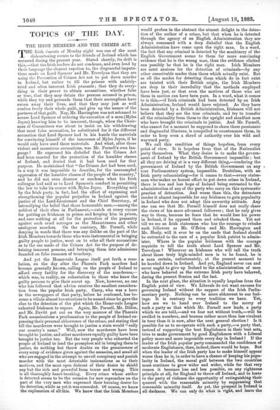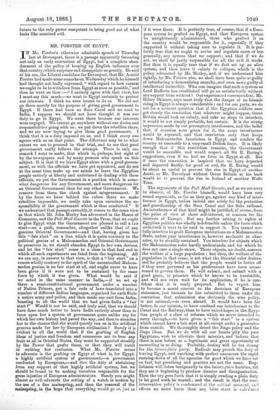TOPICS OF THE DAY.
THE IRISH MEMBERS AND THE CRIMES ACT. THE Irish (.1iieute of Monday night was one of the most disheartening events to the friends of Ireland which has occurred during the present year. Stated shortly, its drift is this,—that the Irish leaders do not condemn, and even lend by their language the clearest sanction to, the disgraceful imputa- tions made on Lord Spencer and Mr. Trevelyan that they are using the Prevention of Crimes Act not to put down murder in Ireland, but rather to fill the prisons with unfairly- tried and often innocent Irish peasants ; that they do every- thing in their power to obtain accusations, whether false or true, that they may detain the persons accused in prison, while they try and persuade them that their accomplices have sworn away their lives, and that they may just as well confess freely their whole guilt, and give up the names of the H partners of that guilt. Nay, Mr. Harrington was not ashamed to accuse Lord Spencer of ordering the execution of a man (Myles Joyce) knowing him to be innocent, though, when the Chair- man of Committees was about to insist on his withdrawing that most false accusation, he substituted for it the different accusation that Lord Spencer had in his hands the materials for convincing himself of the innocence of Myles Joyce, if he would only have used those materials. And what, after those violent and monstrous accusations, was Mr. Pamell's own lan- guage ? He expressed his disbelief that the Crimes Act had been enacted for the protection of the humbler classes of Ireland, and denied that it had been used for that purpose. He maintained that " the Crimes Act had been used, in a way it was impossible to describe, for the unexampled oppression of the humbler classes of the people of the country," and he did not even disavow or condemn what his Irish colleague had said as to Lord Spencer's conduct in permitting the law to take its course with Myles Joyce. Everything said by the Irish party, in fact, had the effect of expressing and strengthening the popular prejudice in Ireland against the justice of the Lord-Lieutenant and the Chief Secretary, of intensifying the belief that those honourable men,—among the noblest of their class in Parliament,—catch at every excuse for putting an Irishman in prison and keeping him in prison, and care nothing at all for the protection of the peasantry against such cruel outrages as the Maamtrassna and other analogous murders. On the contrary, Mr. Parnell, while denying in words that there was any dislike on the part of the Irish Members towards those who were instrumental in bringing guilty people to justice, went on to echo all their accusations as to the use made of the Crimes Act for the purpose of de- taining innocent persons, and betraying them into admissions founded on false rumours of treachery.
And yet the Home-rule League itself put forth a reso- lution, on the day after the Phoenix Park murders had become generally known, calling on the people of Ireland to afford every facility for the discovery of the murderers,— which was, in reality, an exhortation to those who knew the guilty persons to give their secret up. Now, however, no one who has followed that advice receives the smallest considera- tion from the popular Irish party. Carey, who was a hero in the newspapers of that party, before he confessed, has be- come a villain almost too atrocious to be named since he gave the clue to the detection of the plot which the Home-rule League exhorted Irishmen to expose. Again, Mr. Parnell, Mr. Dillon, and Mr. Davitt put out on the very morrow of the Phoenix Park assassinations a proclamation to the people of Ireland ex- pressing their personal abhorrence of the crime, and stating that till the murderers were brought to justice a stain would "sully our country's name." Well, now the murderers have been brought to justice, and other murderers equally guilty have been brought to justice too. But the very people who exhorted the people of Ireland to lend the promptest aid in bringing them to justice, do nothing but throw doubts on the genuineness of every scrap of evidence given against the assassins, and assail all who are engaged in the attempt to unveil conspiracy and punish murder with the most detestable insinuations as to their motives, and the most open distrust of their desire to shield any but the rich and powerful from terror and wrong. This is all thoroughly heart-breaking. Every crime whose author is detected seems to be the occasion for new reproaches on the part of the very men who expressed their burning desire for its detection, while as yet it was concealed. Of course, we know the explanation of all this. We know that the Irish Members would profess in the abstract the utmost delight in the detec- tion of the author of a crime, but that when he is detected through the agency of an English Administration they are• always consumed with a deep disbelief that the English Administration have come upon the right man. In a word, the fact that any criminal is detected by the machinery of the English Government seems to them far more convincing evidence that he is the wrong man, than the evidence elicited can possibly be that he is the right man. Irish Members are mast anxious for the detection of criminals—by any other conceivable modes than those which actually exist. But as all the modes for detecting them which do in fact exist are tainted with their British origin, the Irish Members are deep in their incredulity that the methods employed have been just, or that even the motives of those who set them in motion can have been pure. In a word, what it comes to is this, if Irish criminals had been detected by an Irish Administration, Ireland would have rejoiced. As they have been detected by a British AdMinistration, Irishmen will not believe that they are the true criminals, and try to transfer all the criminality from them to the upright and steadfast men who have brought the criminals to justice. And Mr. Parnell, who cannot for a moment be supposed to share these passionate and disgraceful illusions, is compelled to countenance them, in. order to keep even a shred of authority over his wild and wayward party.
We call this condition of things hopeless, from every point of view. It is hopeless from that of the Nationalist party themselves. What they desire is to make the govern- ment of Ireland by the British Government impossible ; but all they are driving at is a very different thing,—rendering the government of Ireland by the British- Government on any • true Parliamentary system, impossible. Doubtless, with an Irish party calumniating—for it comes to that—every states- man who makes an honest effort to put down crime in Ireland, there is less and less hope of Ireland being entrusted to the administration of any of the party who carry on this systematic practice of detraction. And worse than this, the detractors render it almost impossible for any Irishman to gain popularity in Ireland who does not adopt this unworthy attitude. Any one can see that Mr. Parnell himself does not really share the views of his more advanced followers ; that he only gives way to them, because he fears that he would lose his power in Ireland, if he opposed them and rebuked them. Yet not till we see an Irish statesman who has the courage to rebuke such followers as Mr. O'Brien and Mr. Harrington and Mr. Healy, will it ever be on the cards that Ireland should be entrusted to the care of a popular Irish patriot to admin- ister. Where is the popular Irishman with the courage requisite to tell the truth about Lord Spencer and Mr. Trevelyan ? Wherever an Irishman who will tell the truth about those truly high-minded men is to be found, he is a man certain, unfortunately, at the present moment to be howled down in Ireland. And yet, England never can and never ought to give up Ireland to the administration of men who have behaved as the extreme Irish party have behaved, during the present Session and the last.
In the next place, the situation is equally hopeless from the English point of view. We Liberals do not want excuses for governing Ireland without the support of the Irish Parlia- mentary party. Nothing can be more abhorrent to our feel- ings. It is contrary to every tradition we have. Yet, how are we to hand over Ireland to the mercy of such a party as that which Mr. Parnell now leads, a party which we are told,—and we fear not without truth,—will be swelled in numbers, and become rather more than less virulent in tone than it is now, after the next general election ? Is it possible for us to co-operate with such a party,—a party that, instead of supporting the best Englishmen in their best acts, tries to make government by good Englishmen with a Liberal policy more and more impossible every day in Ireland? If the leader of the Irish popular party commanded the confidence of moderate Englishmen, then, indeed, there would be hope. But when the leader of the Irish party has to make himself appear worse than he is, in order to have a chance of keeping his popu- larity in Ireland, the moral gulf between the two countries must continue to grow wider and wider, while for that very reason it becomes less and less possible, on any righteous principle at all, for England to throw off Ireland, and to leave to the party of violence the opportunity of extinguishing their quarrel with the reasonable minority by suppressing that reasonable minority itself. As yet, the prospect in Ireland is all darkness. We can only do what is right, and leave the future to the only power competent to bring good out of what looks like unmixed evil.



































 Previous page
Previous page